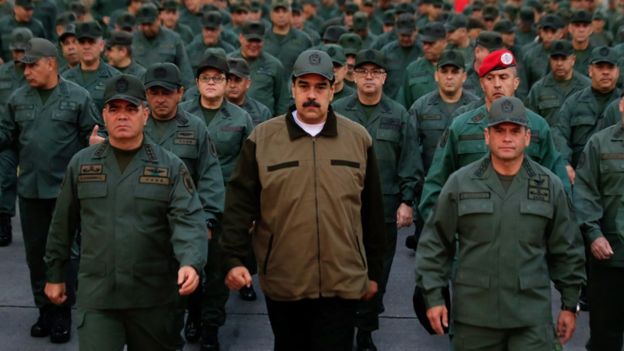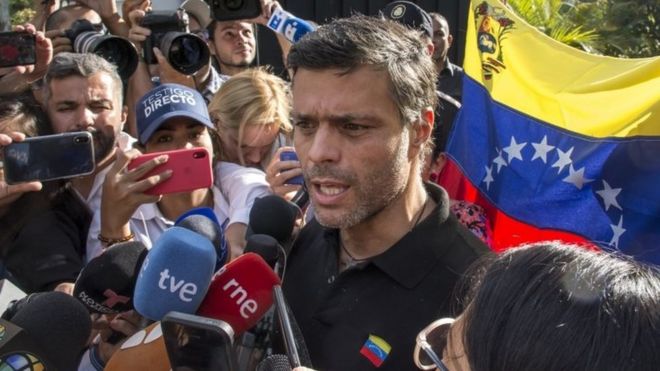Saving Venezuela from Maduro : What Happened?
"The opposition took a step backward with the military."
"Guaido appearing with Lopez at a single point in the city with a few dozen soldiers and no major firepower showed their weakness."
Rocio San Miguel, president, Control Ciudadano watchdog group
"Many of us thought, as the weeks went by, that it was astonishing Maduro hadn't discovered it already but that may be because so many on the inside wanted it to succeed."
"They believe Maduro began to get an understanding of what was happening on the 29th and they had to move on the 30th or it would all collapse."
Unnamed authority
"I spent two years in complete isolation at Ramo Verde [prison]."
"It was not easy. I was tortured. I don't want to go back to jail, because jail is hell."
"But I'm not afraid of jail, just like I'm not afraid of Maduro."
Leopoldo Lopez, Venezuelan political prisoner
"[Any attempt to detain Guaido would be] highly inflammatory."
"From Maduro's perspective, it might be better to simply dismiss Guaido as a mere nuisance and a U.S. stooge, thereby undermining Guaido's faltering movement and -- once again -- splintering the fractious Venezuelan opposition."
Eileen Gavin, senior Latin American analyst, Verisk Maplecroft, global risk consultancy
 |
| President Maduro (C) appeared alongside military forces EPA |
When plans hang on a thread, that constitutes a very thin grip on Madame Fortune's game of chance. And by chance despite the high popularity of both Venezuelan opposition leader (acting president) Juan Guaido and his mentor, high-profile political prisoner and political agitator Leopoldo Lopez their co-appearance at a rally to persuade Venezualans to rise en masse in demonstrations to leave no doubt that the days of disastrous misgovernance by current Venezuelan Nicolas Maduro must end, ended instead in disaster for the move to unseat him from power.
All the niggling little details of persuasion and agreement had been meticulously seen to. The birds were all in hand and prepared to leave the nest. Until the nest, though uncomfortable and past its useful prime appeared more secure for the present than flight into the unknown. It took two months to cajole and plead with principles close to President Maduro to abandon a man whose abysmal administration of a once-prosperous and proud nation had sent it reeling into dysfunction.
But it worked; in theory and expectations of fruition. Until, as one Venezuelan involved in the 'transfer of power', blamed Lopez for "unilaterally" demanding to appear in public alongside Juan Guaido, who agreed. Lopez himself informed reporters that he had been negotiating for weeks with "commanders, generals, representatives of different branches of the armed forces and police". Presumably while still under house arrest.

And it was the understanding of the White House authorities involved behind the scenes that Defense Minister Vladimir Padrino Lopez, Maikel Moreno, president of the Venezuelan supreme court, and Ivan rafael Hernandez Dala, head of both the presidential guard and of military counter intelligence were prepared and committed to aid in the transition, ushering Maduro off stage and Guaido to centre stage. But that seeing Mr. Lopez onstage threw them off, identifying him as a "trouble-maker".
U.S. Secretary of State Mike Pompeo blamed Russia for intervening at the final moment when Maduro had finally realized what was going to happen, and feeling himself besieged rushed to a banker with plans to escape in a flight to Cuba the following day. The Kremlin assured him that all would be well, that he must maintain his position in Venezuela.
On the other hand, speculation has it that Defence Minister Lopez while part of the negotiations informed Maduro, the Russians and Cuban allies of the plot. The plot began when elite officials in the Maduro regime thought it time to dialogue with opposition figures to create bridges to rescue the country mired in hyperinflation, unemployment, food and energy and medical shortages, and millions of Venezuelans leaving to take up residence as refugees in neighbouring countries.
Over fifty countries now recognize Guaido as interim president of Venezuela, in reaction to the rigged re-election of Nicolas Maduro last year. "A majority of the high command were talking with the Supreme Court and Juan Guaido about a change in government with the departure of Maduro and with guarantees for the military", Elliott Abrams, U.S. State Department special envoy for Venezuela stated on Wednesday.
The following day, a court in Caracas issued a warrant for the arrest of Leopoldo Lopez, revoking house arrest, ordering that he spend the balance of his 13-year sentence, with eight years left on his conviction of arson and instigating violence against the state. He and his family lost no time in seeking asylum at the Spanish embassy which vows to protect him.
"You only get to play this card once, and now that it's been played it's hard to see what else can be done", pronounced Fernando Cutz who until recently led U.S. policy at the National Security Council in Washington.
Yet, the reality is that Maduro's regime is loathed by most of the Venezuelan people. He is responsible for the decay of a once-great nation now belching its frantic population across the border as refugees as those within the country face starvation and the total disintegration of civil democracy into military rule.
 |
| Leopoldo López sought refuge at the Spanish diplomatic mission after Tuesday's dramatic events Getty Images |
Labels: Crisis Management, Failed Coup, Opposition, Political Crisis, Venezuela
0 Comments:
Post a Comment
<< Home